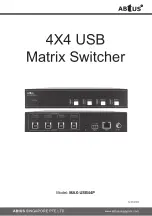
5-13
Multiple Instance Spanning-Tree Operation
802.1s Multiple Spanning Tree Protocol (MSTP)
and designated port for each region. The CIST includes the Common Spanning
Tree (CST), the Internal Spanning Tree (IST) within each region, and any
multiple spanning-tree instances (MSTIs) in a region.
Common Spanning Tree (CST):
Refers to the single forwarding path the
switch calculates for STP (802.1D) and RSTP (802.1w) topologies, and for
inter-regional paths in MSTP (802.1s) topologies. Note that all three types of
spanning tree can interoperate in the same network. Also, the MSTP switch
interprets a device running 802.1D STP or 802.1w RSTP as a separate region.
(Refer to figure 5-2 on page 7.)
Internal Spanning Tree (IST):
Comprises all VLANs within a region that
are not assigned to a multiple spanning-tree instance configured within the
region. All MST switches in a region should belong to the IST. In a given region
“X”, the IST root switch is the regional root switch and provides information
on region “X” to other regions.
MSTP (Multiple Spanning Tree Protocol):
A network supporting MSTP
allows multiple spanning tree instances within configured regions, and a
single spanning tree among regions, STP bridges, and RSTP bridges.
MSTP BPDU (MSTP Bridge Protocol Data Unit):
These BPDUs carry
region-specific information, such as the region identifier (region name and
revision number). If a switch receives an MSTP BPDU with a region identifier
that differs from its own, then the port on which that BPDU was received is
on the boundary of the region in which the switch resides.
MSTP Bridge:
In this manual, an MSTP bridge is a 2810 Switch (or another
802.1s-compatible device) configured for MSTP operation.
MST Region:
An MST region forms a multiple spanning tree domain and is a
component of a single spanning-tree domain within a network. For switches
internal to the MST region:
■
All switches have identical MST configuration identifiers (region name
and revision number).
■
All switches have identical VLAN assignments to the region’s IST and
(optional) MST instances.
■
One switch functions as the designated bridge (IST root) for the region.
■
No switch has a point-to-point connection to a bridging device that cannot
process RSTP BPDUs.
Summary of Contents for ProCurve 2810-24G
Page 1: ...Advanced Traffic Management Guide 2810 www procurve com ProCurve Series 2810 Switches N 11 XX ...
Page 2: ......
Page 3: ...ProCurve Series 2810 Switches Advanced Traffic Management Guide July 2007 ...
Page 11: ...ix Web Viewing and Configuring Stacking 7 47 Status Messages 7 48 Index ...
Page 12: ...x ...
Page 76: ...3 18 GVRP Introduction ...
Page 271: ......
















































